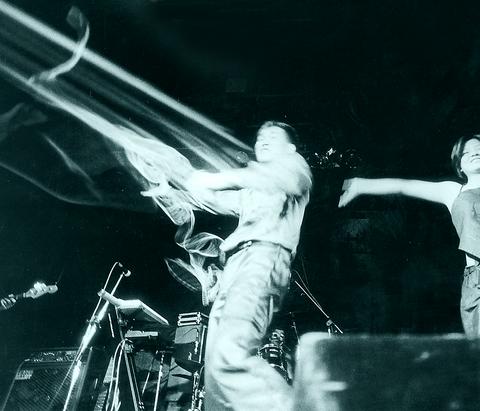Huashan Arts District looks like it may be setting itself up for another ambush by the morality police by establishing a music hall that will hold an ongoing series of concerts beginning tonight.
The last time anything musical happened at Huashan, someone snooped around with a camera filming a crowd attempting to recreate the tribal feel of Goa in the run-down factory compound. There was fire, drums and, hold onto your seat grandpa, men dancing with their shirts off. The next day most media outlets, except, of course, Taipei Times, tried to outdo themselves in reporting the scenes of alleged drug-fueled decadence at Huashan.

PHOTO COURTESY OF TCM
"Foreigners make Huashan new `head-shaking' paradise" took the honors as the most off-the-wall and absurd headline from the (China Times Express). After some heated and perfectly justified indignation directed at the media and two politicians' opportunistic attacks on Huashan, the shrill accusations and denials have died down and the music, it seems, can start back up again.
This time, though, rock and jazz are on the menu, not the electronic music and tribal stuff that so often draw suspicion.
"Our event is about music, pure and simple. It's got nothing to do with that whole drum circle controversy. We're moving on from that," said Chu Chien-hui (朱劍輝), the bassist for China Blue and organizer of the concert series.
The concerts will feature some of Taiwan's best underground and not-so-underground bands performing in the newly opened space every day except on Mondays. Acclaimed folk singer Chen Ming-chang
"We want the Huashan music hall to be a new space for experienced bands and some of the many up-and-coming bands to have a chance to meet each other and perform. Other than Riverside, Underworld, Zeitgeist and Witches House, there aren't many spots in town for bands to perform. It always helps to have more performance venues," Chu said.
With the hall operating on government property, Chu said the space should set parents' minds at ease by guaranteeing a safe and healthy environment for young people to come out and enjoy live music, despite the whole uproar last month.
In an effort to give start-up bands a chance to play somewhere other than garages and practice studios, Chu said the organizers have already started accepting demo tapes from student bands for shows that will hopefully occur every Thursday starting at the end of August.
Following last month's drum circle aftermath, the concert series should restore the focus at Huashan to art. And the concerts will be held indoors, so the decibel levels that allegedly kept neighbors awake at night during the drum circle won't be a problem. Just be careful not to bang your head in front of any video camera or you just might see yourself on the news the next day.

In the March 9 edition of the Taipei Times a piece by Ninon Godefroy ran with the headine “The quiet, gentle rhythm of Taiwan.” It started with the line “Taiwan is a small, humble place. There is no Eiffel Tower, no pyramids — no singular attraction that draws the world’s attention.” I laughed out loud at that. This was out of no disrespect for the author or the piece, which made some interesting analogies and good points about how both Din Tai Fung’s and Taiwan Semiconductor Manufacturing Co’s (TSMC, 台積電) meticulous attention to detail and quality are not quite up to

April 21 to April 27 Hsieh Er’s (謝娥) political fortunes were rising fast after she got out of jail and joined the Chinese Nationalist Party (KMT) in December 1945. Not only did she hold key positions in various committees, she was elected the only woman on the Taipei City Council and headed to Nanjing in 1946 as the sole Taiwanese female representative to the National Constituent Assembly. With the support of first lady Soong May-ling (宋美齡), she started the Taipei Women’s Association and Taiwan Provincial Women’s Association, where she

Chinese Nationalist Party (KMT) Chairman Eric Chu (朱立倫) hatched a bold plan to charge forward and seize the initiative when he held a protest in front of the Taipei City Prosecutors’ Office. Though risky, because illegal, its success would help tackle at least six problems facing both himself and the KMT. What he did not see coming was Taipei Mayor Chiang Wan-an (將萬安) tripping him up out of the gate. In spite of Chu being the most consequential and successful KMT chairman since the early 2010s — arguably saving the party from financial ruin and restoring its electoral viability —

It is one of the more remarkable facts of Taiwan history that it was never occupied or claimed by any of the numerous kingdoms of southern China — Han or otherwise — that lay just across the water from it. None of their brilliant ministers ever discovered that Taiwan was a “core interest” of the state whose annexation was “inevitable.” As Paul Kua notes in an excellent monograph laying out how the Portuguese gave Taiwan the name “Formosa,” the first Europeans to express an interest in occupying Taiwan were the Spanish. Tonio Andrade in his seminal work, How Taiwan Became Chinese,